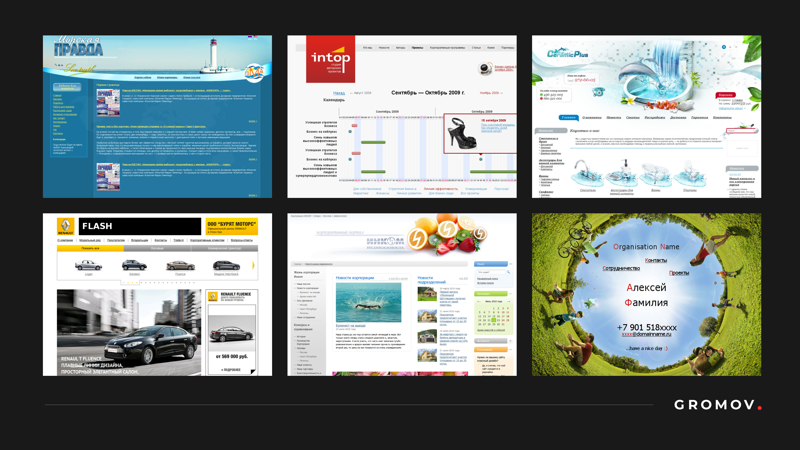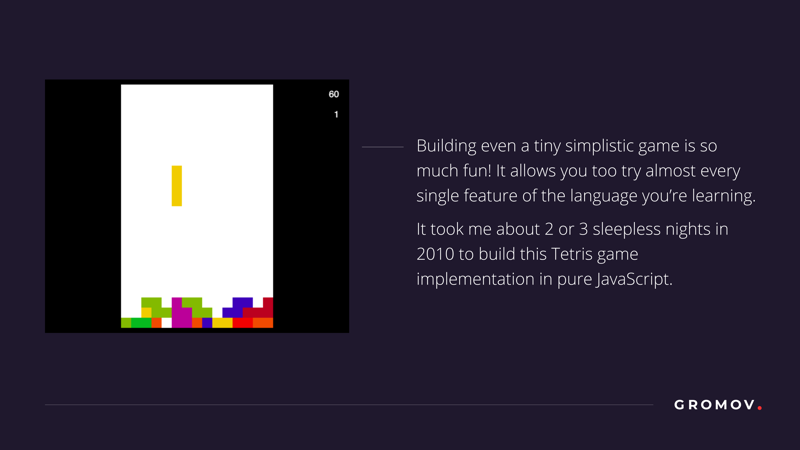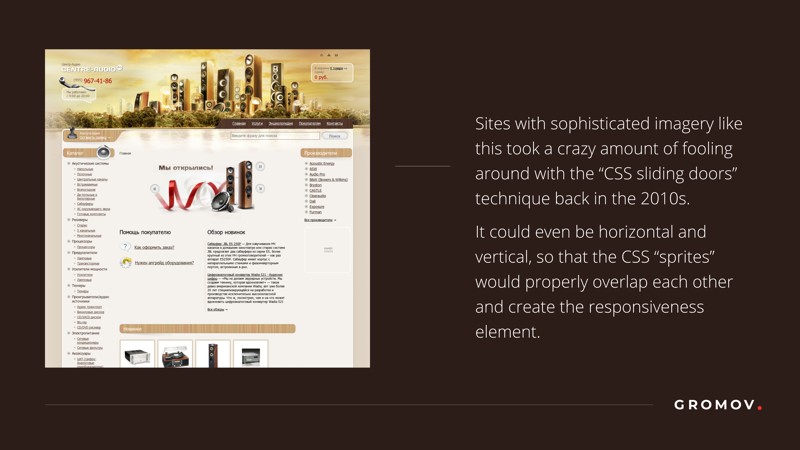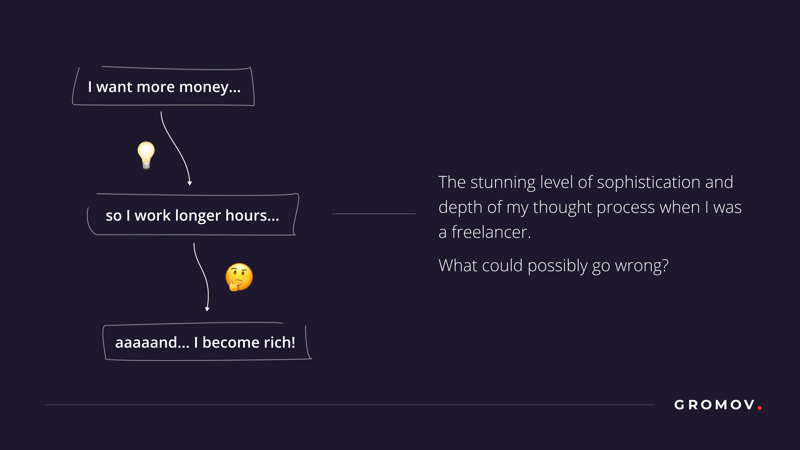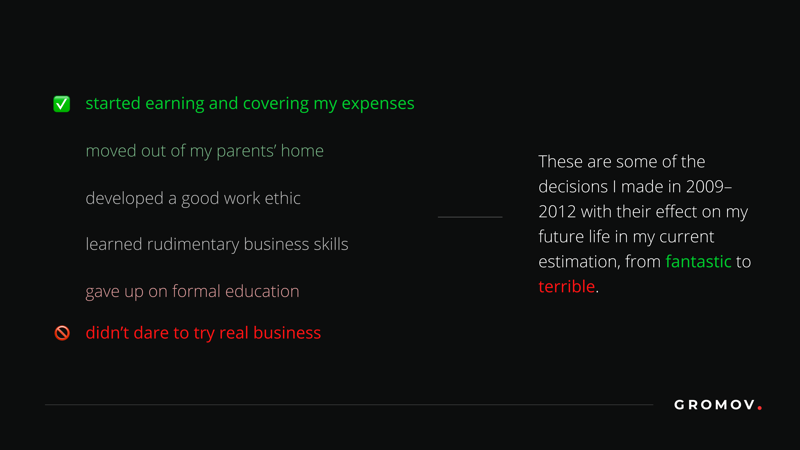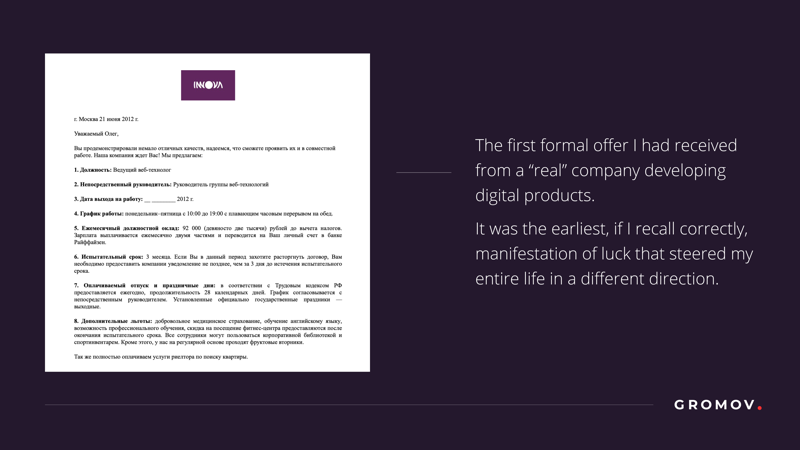In 2009—2012, I was a freelancer. Over these 3 years I had built about 100 projects for various clients. It was mostly HTML & CSS coding for design/marketing agencies, but there were a few interesting projects as well.
A PDF3d converter UI in C++ and QT for Linux/Windows, a web-version of it in PHP and JavaScript, some UI/UX design and development for back-office systems, a few full cycle websites.
But the bulk of it was website templates in HTML & CSS.
What I Had Learnt
When I started freelancing, I knew how to code in general — thanks to the endless nights spent tinkering with C, C++, assembly. Later came JavaScript, which I learnt and got comfortable with in 2010 by building a Tetris game implementation.
And, of course, thanks to the year of working as a web developer when I was mostly writing HTML, CSS and some JavaScript with jQuery. This was in 2007—2008, my first ever job at a small outsourcing/outstaffing company called Gurnet Group.
Gurnet was selling its services to a few US-based companies, and I completely missed the huge profit margins they must've been making. I was paid about $250 per month when I worked part-time, and up to $500-600 when I switched to full time.
Crazy. I guess the rates for my work alone were $20-30 per hour, and for the full team we were, they must've been in hundreds per hour. But I was totally oblivious to that fact.
HTML, CSS, JavaScript
The three main things I worked with back then were HTML, CSS and JavaScript. Sites in the beginning of the 2010s were almost static, and the most technically sophisticated part of my job was to create tiny components such as carousels or dropdown menus.
Building layouts, however, was a whole different story. There wasn't flex-box or grid, CSS was barely supported at version 2.0 or 2.1 at best, there still existed the "browser zoo" with no clear winner. And all these browsers were incompatible to each other in their CSS & JS interpretation. jQuery was a big thing, because it abstracted away these differences.
So a typical layout I'd built for a site was quite a creative piece. I'd use floats a lot to mimic multi-column layout, there were obscure and not so well understood tecniques such as sliding doors (aka CSS sprites) to allow for a flexible width of an element with a raster background. This was due to either lack of border-radius in CSS, or browser support of it.
Without a doubt, all this sorcery was quite fun for a while. But not forever.
Hating Web & Missing On Learning
So I was making money as a web developer, but I started really disliking web.
It was too quirky as less things were standardised, I wasn't quite sure I wanted to be a full-time programmer and kept playing with hardware, installing Linux distribs, and doing other strange things such as making a boot loader written in assembly display a flag instead of booting up an OS.
CSS was still gaining momentum, and I still remember that sites like CSS Zen Garden were a big deal back then.
Ultimately, it made me miss on lots of opportunities to learn back-end, new languages, databases, etc — not in theory, which I already thought I'd known, but in practice. I had also given up on working as a C++ developer and learning systems related stuff, which seemed much cooler and closer to what I enjoyed.
Prior to freelancing, in about 2008, I could only find and interview for a single C++ position in my home town. They were even ready to accept me as a junior developer — but I didn't have a "military ID", a document all Russian men until the age of 27 are required to have to demonstrate their conscription status.
So I was rejected based on these purely bureaucratic grounds, started freelancing, and learned to hate web.
Rudimentary Business Skills
On a different front, after working on projects with fixed deadlines for dozens of clients, I developed some decent work ethics.
I learnt the importance of:
- keeping my word and communicating clearly, especially when things didn't go as my clients expected
- being honest and fair, which made me issue refunds for at least 10 projects that I started but failed to finish
It seems that I also understood a fair bit about project management, sales, and running a tiny business.
Overall, good and useful stuff. But it took me a bit longer than I think it was worth. Perhaps a year of freelance would be more than enough, but then there was the money.
Money
As a freelancer in 2009—2012, I was making somewhat in the range of 20,000 to 60,000 rubles per month. It's hard to take into account purchasing power of that amount in the 2010s in Russia, but to put my earnings into some perspective, it was between $800 and $2,000 per month. Quite decent money as I reckon now!
My ambition, however, sprawled way beyond that. I wanted more, much more. I remember vividly how I was standing on the stairs of a typical soviet 1960s apartment building and thinking:
Why is such a basic thing as buying a flat is so unaffordable? Everyone must have a place to live without spending 20-30 years to pay off a mortgage. Life surely shall have a greater purpose!
So I dreamt big. And I thought I could endlessly scale up my work hours (not increasing prices — note that!). Which, of course, led to a total burnout. In just about 3 years from beginning to freelance, I fell back to barely doing any interesting work, became almost unable to sell my services and find great projects, and made only about $500-700 a month.
Perhaps, this was the first time I experienced a professional identity crisis not really knowning what to do next.
Inspiration & Creativity
Despite the fact that I had totally burnt out professionally by the middle of 2012, I still dreamt of things larger and more important than personal comfort and decent income.
One of my ideas back then was to build a project I called "Cosmodrome". It would be a platform where professionals with zero to little experience would connect with small business lacking money for the mutual good. Designers and developers would do real work and earn experience and skills, while entrepreneurs would get work done basically for free. Good stuff with a clear motivation.
There was a lot more to that idea, such as building a marketplace around it, inviting experienced folks as mentors to help steer the process, adding a job board, etc. And it was in 2009 or so.
Had I dared to build Cosmodrome back then, I suspect I could've ended up in a very different place and situation right now!
Even though I was tired of freelance work, I remained quite ambitious and energetic. This is the feeling I really miss sometimes and hope to summon it back again.
Life in General
Back then I stepped into my 20s. Being a product of a poor family, I absolutely consciously had chosen to work instead of studying further. Of course, without fully understanding the consequences of this choice.
In 2010, when I was 21, I first moved out from my parents home and started living on my own. And I think it was waaaay later than ideal because I earned my first money at about the age of 14 (as a "computer expert" solving software and hardware issues for a small fee) and kept earning consistently since 2007.
Did I tell you that this was the beggining of my true adult life?
A Univerisity Dropout
Not knowing what to do next, I also decided to go for a "distance learning" degree in economics. With the help from my friend Viktor who volunteered to solve math problems for me, I made it to the university.
My future undergraduate degree was in economics as I thought it was needed to run a business. But they never taught us any business in the 1st year, I quickly got bored, and most importantly, didn't want to put any time and effort into learning.
So I failed to pass mid-term math tests and dropped out about a year later.
Understanding of the World
Until August 2012, I had never lived in a place other than my home town. I didn't know English, had no idea about politics, economy, or big business, was unaware of technology trends or anything else driving and shaping the world.
I dreamt big, yes, especially after reading Richard Branson's biography or the "Rich Dad, Poor Dad" bullshit classic. But the future looked very vague and pale.
In the beginning of 2010s, a qualified and experienced software engineer (not me!) living in a small Russia town, not Moscow or Saint Petersburg, would make maybe $1,000-1,500 a month. Decent money but not nearly as much as a decade later. Now, we usually call tech folks the "IT nobles" because they can make 10x more than a qualified professional in a different field in Russia.
So I didn't want to become a professional programmer. In fact, I have never wanted to be one! On the contrary, building a business seemed to be a good way forward but I had almost zero relevant knowledge or skills, zero assets, and no connections.
Another thing I tried was project management. In 2009 I joined the local web design agency called Immelman (surprisingly, they still exist and work!), but I could only make it through a single month as I was simply not needed there in that capacity.
Books
The years up till 2012 were the ones when I learned most from the books. I read lots of classics:
- Mythical Man-month by F. Brooks
- Inmates are Running the Asylum by A. Cooper
- Deadline by T. DeMarco
- Peopleware: Productive Projects and Teams by T. DeMarco and T. Lister
- Essays and books by Joel Spolsky
- Design of Everyday Things by D. Norman
- The Art of UNIX Programming by E. Raymond
- Don't Make Me Think by S. Krug
- About Face by A. Cooper
And the list goes on as I don't even remember everything I read. By I loved books, hoarded them, was always reading. This feels as one of the best periods in my life!
I also read lots of technical stuff about C, C++, operating systems, networks, Linux. But most of this knowledge I couldn't use directly and it was just dumping into the depths of my memory. While intensively shaping what I've known and thought about software development, design, teamwork and business since then.
What I Did Right and Wrong
During the freelancing period of 2009—2012, I had optimised heavily for a higher income. I would take projects with a higher sheer volume of work (think a 100 pages site) and tried working longer hours at the expense of my sanity.
Relationships with my friends and family became strained for the first time in my life. Not least because of the way I "managed" my work & life, with a huge bias towards working more so that I could have more money and buy more stuff.
I started earning significant money for the first time in my life too. Now I could afford eating out almost every evening, buying more decent clothes, traveling a bit (inside the country of course). I bought myself a new Sony Vaio laptop after sitting at garbage desktop computers for the past 10 years. I even managed to save for and buy a (used) car, a Mercedes W201 built in 1984.
This all felt like success at the time. I broke out of poverty! But I'd made at least two mistakes that feel important now.
-
I didn't dare to grow my freelance practice into an agency, even though I wanted to. Didn't try to hire and manage people, didn't go for my dream of being a businessman.
-
Yes, I kept learning in practice, from real-world projects and situations, read many books. But I totally abandoned formal education especially in the yet uncharted territories.
I believe theat the beauty of early adulthood is in freedom, abundance of time and energy, higher mental capacity to acquire and digest new knowledge and skills. And I did use them the best I could at the time, but certainly didn't do everything I was capable of.
Luck & Hard Work
It doesn't feel that prior to 2012, I had any non-negligible amount of luck affecting my life and career. I strived to be a good professional, developed important principles for doing work and dealing with others. But everything I did was mediocre and so were the outcomes.
Nonetheless, I have never wanted to be average! After recovering from the fairly deep exhaustion from overworking, I started feeling a taste for life again. It was the first time a life-changing event happened to me without me actively seeking the change.
In the summer of 2012, my freelance profile was found by a recruiter from Innova. Later, Andreyka who would become my manager, interviewed me, apparently liked what he'd seen and heard and suggested me to interview with the company.
After a round of interviews and a paid-for trip to Moscow for an onsite interview, which was mind-blowing to me back then, I was offered a full-time job. Apparently I had shown some integrity, professionalism, and skills that were useful for them.
It was the first time my skills were evaluated for real by a "serious" company developing digital products. And I'd decided to take this leap of faith.
Did you like the article? I'd be happy if you share it with your friends and follow me on Twitter! 🤘
